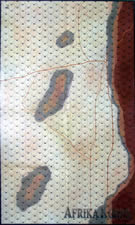| Author |
J6A
|
| Method |
Solo |
| Victor |
Draw |
| Play Date |
2018-03-20 |
| Language |
English |
| Scenario |
AfKo012
|
This is a rather odd scenario. The Italians have a large entrenched force of infantry and anti-tank guns, plus some light artillery, however the British don't have any infantry until (possibly) late in the game. They also have a large tank force sitting in a wadi. For their part, the British have a bunch of light tanks (MkVIbs) later supplemented by some A13s and A10s, and then, possibly, an infantry force with a 25lber in tow (literally).
I read other AARs of this before playing, and they gave me some ideas. With the light British tanks, I made a move towards the entrenched and dug in infantry, hoping to take some pot shots at long range to maybe get a few lucky hits, avoiding the AT guns and Italian tanks. The MkVIbs, as terrible as they are, at least are faster than the Italian infantry and the Italian tankettes in the area. The cruiser tanks don't enter until turn 6, so the Italians used the 1st 5 turns to send a few tanks to try to pin down the MkVIbs, and the rest to ambush the reinforcements.
And ambush they did, with the British losing 3 steps of tanks as they entered the board (nice die rolling by the Italians). I did not play with the rule where efficient tanks, such as the British, can move and fire on the same turn, I think if I replayed this I would. Meanwhile, the MkVIbs ambushed the Italian L3/35s, only to get outrolled by the Italians and caught up in an assault that let the "real" Italian tanks catch up to them.
The tank battle raged by the edge of the board, with the British getting in some licks, but the Italians having the numbers to close to assault range where the British efficiency was less of a factor. With lousy 2 lber guns, the British tanks were better off using their DF values to try to inflict morale checks and step losses in assault, however Italian numbers evened things here.
Meanwhile, some of the Italian infantry came out of their foxholes to try to close with the MkVIbs, and while the British shot up some of them, they should have pulled out of range because being caught in assaults meant that the Italians could bring in reinforcements while there were no spare Brits.
By turn 13, the British had suffered 9 steps of tank losses (out of 18 on the board), giving the Italians their win condition. However, the British had taken a toll on some of the Italian infantry and tankettes in the assault, and then a lucky 12 wiped out 2 steps of M11/39s. In total, this brought the Italians to 16 step losses, which guaranteed the scenario would end in a draw. I called it there because the only other thing that could really happen was the British, now even more badly outnumbered, would be wiped out, and if the reinforcements arrived, it wouldn't change the scenario from being a draw.
There's probably a better way to run the British, however with the Italians able to set up an ambush on the tanks, they have an uphill fight (uphill out of the wadi?). It's hard for me to see this one not being an Italian victory or, more likely, a draw.
|






 AfKo011
AfKo011 





























